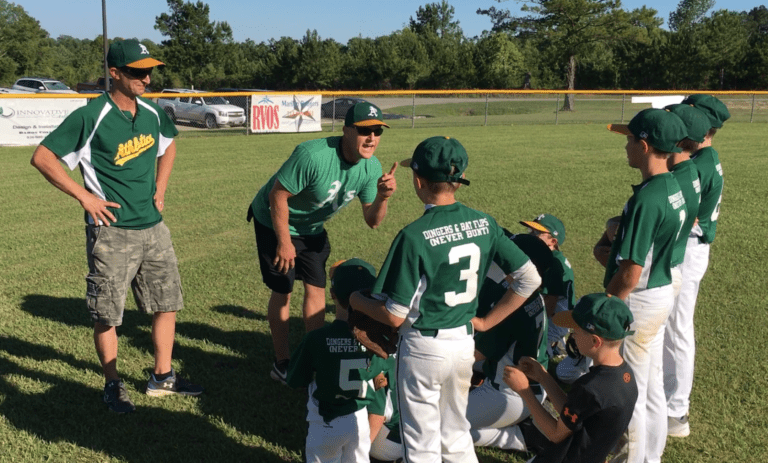The CoachUp ThumbsUp Award: Scott Bergin
Today we’re introducing a new series called The CoachUp ThumbsUp Award, a special post that we’re dedicating to any coach that is making a difference in their community. In the vast sea of coaching — both volunteer and one-on-one trainers — those that shine brightest deserve their time in the spotlight.
Too often, and on this blog in particular, we’re forced to talk about bad coaches, bad parents, and even worse experiences, but what if we flipped the script for once? A few weeks ago, we featured an article in The Washington Post about Scott Bergin, a baseball coach from Texas that poked fun at the all-too serious nature of youth sports by creating pregame speeches bordering on insane parody. In them, Coach Scott looks to knock a few of those hyper-competitive coaches down a peg before the next game. Although they’ve taken on a life of their own in his community, they’ve found a second home on the internet, garnering thousands of views on YouTube.
During our recent phone interview, Scott quickly set the record straight on the importance of winning or losing: “You’re right — it’s not about [that]. To me, though, I want my players to want to win and I’d be lying if I said I didn’t care either,” Scott admitted. “It’s just finding that balance so that you can achieve all your goals at once.”
Scott, he says, was motivated to give his pregame speeches by other coaches and, to him, it’s been a long time coming. Over the last eleven years, Scott has coached baseball just outside of Houston, his long journey taking him from tee-ball up to travel teams — and yet, the more things change, the more things stay the same.
“Every so often, you come across teams with real jerks for coaches. It’s tempting to want to play the game with your sole focus on winning, but you can’t do that — and that’s OK.”
In Texas, baseball seems to get more competitive with each passing year and coaches have selfishly taken it on themselves to break, bend, or eliminate any rule that might get in their way of victory. On the other hand, you’ve got Scott, who is steadfastly loyal to a dying breed of coach:
“Coaches, in their desire to win, will sit players who are new to baseball for as many innings as they’re allowed to and then will stick them out in right field,” Scott said, pausing slightly before he continued: “My goal is to get kids to think: ‘I can’t wait for the next season, I want to play more.’”
That’s the point of youth sports, I think, to create a life-long passion for the game.”
From only playing certain kids in the infield to abusing easy base running rules, Scott has seen baseball adopt a win-at-all-costs attitude that makes his blood boil. These beliefs are not new either, Scott says he’s been seeing these maddening traits since the very beginning. While he’d later suggest that these tactics are just part of a parent’s quest for self-validation, Scott knows that the chance to win is too much to pass up.
“When you’re coaching five year-olds, the majority of them don’t even know if they won or lost. Most leagues don’t keep score, but ours did because the coaches and parents complained. So, really, at that point, who is the game for?”
In response, Scott began crafting those wonderfully playful YouTube videos that would become lore in Houston Little League and land him a feature in The Washington Post. Although Scott insists he was just trying to provide a humorous approach to the madness, he said it felt good to stir the pot a bit amongst his fellow coaches. The more upset they got at his videos, the more Scott realized they were turning into the very same coaches he was parodying.
“They used to have the rule that each player needed to spend at least an inning in the infield — you know, to expose kids to new positions, new experiences — and then one year it was just gone,” Scott explains. “So I brought it up to the board and we put it to a vote… I lost 16-1 in favor being able to stick these six and seven year-olds in the outfield for three hours. Like I said, this stuff makes me insane.”
At the end of the day, Scott puts aside his admittedly competitive nature in order ensure that the kids have something to look forward to. Never pitched before? Here’s the ball. Want to learn how to play shortstop? Scott will help you out there, too. With him, even though he coaches both of his sons, there is no favoritism, only experiences to enjoy.
“You’ve got to give them as much opportunity as possible . . . how can you expect somebody to love something if they’re constantly told that they’re not good enough? How does that help anybody but the coach?”
We want to celebrate Coach Scott and his unflappable commitment to coaching the right way. At his core, Scott would love to win every game, but he knows that’s not his only purpose as a coach. Whether the other coaches are playing young athletes the bare minimum amount or not letting them playing a new position, they’re certainly doing damage to the next generation of athletes.
While most coaches cannot stop themselves, sometimes even skirting the rules in order to get an advantage, Scott’s approach to youth sports is admirable — and the joy in his craft shines through on those YouTube videos. Winning is extra, but there are no shortcuts to loving your sport, as Scott reiterates one, final time:
“Ultimately, without a doubt, I want them to leave with a new-found passion. That sounds cliche, but it’s not. I truly try to coach so that kids end the season not thinking about wins or losses, but saying: ‘Wow, that was so much fun, I can’t wait to do it again.’
And, man, what a shame if you didn’t give that kid an opportunity to love the game.”
How useful was this post?
Click on a star to rate it!
Average rating 4.5 / 5. Vote count: 8
No votes so far! Be the first to rate this post.




One Response
Being a coach, especially at early ages, is teaching LIFE SKILLS. Those skills go beyond any field or gym.
And if the kids don’t have fun, they’re not likely to do it again!
Bravo!!!!